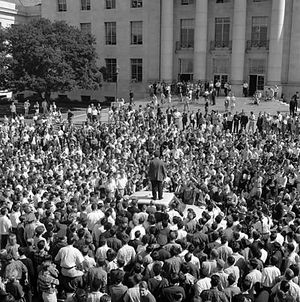Difference between revisions of "Free Speech Movement"
| (5 intermediate revisions by the same user not shown) | |||
| Line 1: | Line 1: | ||
[[File:FSM via picturethis.museumca.org.jpg|thumb|Free Speech Movement leader Mario Savio leading student protestors at the University of California, Berkeley. Nov. 20, 1964. ]] | [[File:FSM via picturethis.museumca.org.jpg|thumb|Free Speech Movement leader Mario Savio leading student protestors at the University of California, Berkeley. Nov. 20, 1964. ]] | ||
{{TOCnestleft}} | {{TOCnestleft}} | ||
| + | '''Free Speech Movement''' "was a struggle by students over the right to engage in political speech on campus". | ||
== Background == | == Background == | ||
| − | The "Free Speech Movement took place at UC Berkeley from Sept. 10, 1964, through Jan. 4, 1965. <ref>[http://bancroft.berkeley.edu/FSM/chron.html, Three Months of Crisis: Chronology of Events | Retrieved August 13, 2015]</ref><ref>[http://bancroft.berkeley.edu/FSM/chron.html, Free Speech Movement, UC Berkeley - Online Audio Recordings | Retrieved August 13, 2015]</ref> It was a "student protest...under the informal leadership of students [[Mario Savio]], | + | [[File:Mario Savio atop the police car holding FSM organizer Jack Weinberg.jpg|thumb|Mario Savio atop the police car holding FSM organizer Jack Weinberg via news.berkeley.edu]]The "Free Speech Movement took place at UC Berkeley from Sept. 10, 1964, through Jan. 4, 1965. <ref>[http://bancroft.berkeley.edu/FSM/chron.html, Three Months of Crisis: Chronology of Events | Retrieved August 13, 2015]</ref><ref>[http://bancroft.berkeley.edu/FSM/chron.html, Free Speech Movement, UC Berkeley - Online Audio Recordings | Retrieved August 13, 2015]</ref> It was a "student protest...under the informal leadership of students [[Mario Savio]], [[Jack Weinberg]], [[Michael Rossman]], [[Brian Turner]], [[Bettina Aptheker]], [[Steve Weissman]], [[Art Goldberg]], [[Jackie Goldberg]], [[Jack Kurzweil]]..." |
| + | |||
| + | The FSM "was a struggle by students over the right to engage in political speech on campus, which helped to catalyze broader political activism on campuses around the country over student rights, civil rights and the Vietnam War."<ref>[http://www.berkeleydailyplanet.com/issue/2000-04-06/article/759?headline=Don-t-trust-anyone-over-30-unless-it-s-Jack-Weinberg--Daily-Planet-Staff, Don't trust anyone over 30, unless it's Jack Weinberg | Retrieved August 14, 2015]</ref> | ||
| + | |||
| + | == Representation == | ||
| + | |||
| + | [[Robert Treuhaft]], "a radical left-wing attorney prominent in progressive and New Left politics in the San Francisco Bay Area" acted as counsel for the Free Speech Movement, "representing the more than 700 students arrested at the University of California at Berkeley during a two-day sit-in in 1964. He himself was also arrested during the sit-in, at the direction of then- Assistant District Attorney of Alameda County, Edwin Meese, who later became Attorney General during the Reagan presidency. In addition, Treuhaft and his firm [[Treuhaft, Walker and Burnstein]] represented anti-Vietnam War protesters, [[Black Panther Party]], the [[Student Nonviolent Coordinating Committee]] (SNCC), the [[Congress of Racial Equality]] (CORE), and University of California students and town residents arrested during the struggle over People’s Park in Berkeley."<ref>[http://dlib.nyu.edu/findingaids/html/tamwag/tam_664/bioghist.html, Tamiment Library and Robert F. Wagner Labor Archive / The Robert E. Treuhaft Papers | Retrieved August 10, 2015]</ref> | ||
==References== | ==References== | ||
{{reflist|2}} | {{reflist|2}} | ||
Latest revision as of 22:42, 14 August 2015
Template:TOCnestleft Free Speech Movement "was a struggle by students over the right to engage in political speech on campus".
Background
The "Free Speech Movement took place at UC Berkeley from Sept. 10, 1964, through Jan. 4, 1965. [1][2] It was a "student protest...under the informal leadership of students Mario Savio, Jack Weinberg, Michael Rossman, Brian Turner, Bettina Aptheker, Steve Weissman, Art Goldberg, Jackie Goldberg, Jack Kurzweil..."
The FSM "was a struggle by students over the right to engage in political speech on campus, which helped to catalyze broader political activism on campuses around the country over student rights, civil rights and the Vietnam War."[3]
Representation
Robert Treuhaft, "a radical left-wing attorney prominent in progressive and New Left politics in the San Francisco Bay Area" acted as counsel for the Free Speech Movement, "representing the more than 700 students arrested at the University of California at Berkeley during a two-day sit-in in 1964. He himself was also arrested during the sit-in, at the direction of then- Assistant District Attorney of Alameda County, Edwin Meese, who later became Attorney General during the Reagan presidency. In addition, Treuhaft and his firm Treuhaft, Walker and Burnstein represented anti-Vietnam War protesters, Black Panther Party, the Student Nonviolent Coordinating Committee (SNCC), the Congress of Racial Equality (CORE), and University of California students and town residents arrested during the struggle over People’s Park in Berkeley."[4]
References
- ↑ Three Months of Crisis: Chronology of Events | Retrieved August 13, 2015
- ↑ Free Speech Movement, UC Berkeley - Online Audio Recordings | Retrieved August 13, 2015
- ↑ Don't trust anyone over 30, unless it's Jack Weinberg | Retrieved August 14, 2015
- ↑ Tamiment Library and Robert F. Wagner Labor Archive / The Robert E. Treuhaft Papers | Retrieved August 10, 2015

